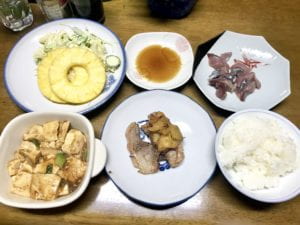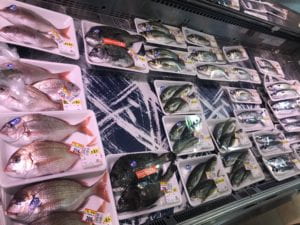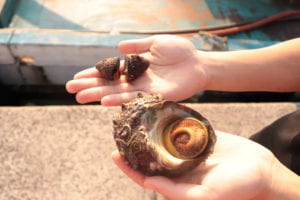(I apologise in advance for the long post… I was too beWILDered by this topic)
I often say that it would be great if humans can go back to our caveman days – to lead simple lifestyles and have ourselves integrated back into the ecosystem. It would solve so many of the world’s current problems: waste, climate change, poverty, even mental health. But if I think about it, would I be able to lead such a life? I don’t think so. I can’t even climb a mountain without following a set, man-made path (we had to circle the mountain we wanted to hike up and nearly gave up because we couldn’t find the entrance…). We can’t even tell what kind of plants are edible – we ended up foraging on the path up the mountain as there were so many sweet-smelling fruits, but we had no idea if they were poisonous. It hit me then that we were so used to just picking up anything at the supermarket that we don’t actually have the ability to tell whether what we were holding was edible. On top of that, having lived a sedentary lifestyle as a stressed and lazy student for almost all my life, my body is so weak that I find simple farm work tough. I am inevitably stuck as a modern, spoiled human being who is weak, delicate and unable to survive in the wild. Perhaps I can adjust to it, but it will take a long time and require many uncomfortable changes to my life.
When we think about food, something we don’t often think about but is vital is where our food comes from – whether it is farmed or wild caught. Previously I never really distinguished between the two, but experiencing life in the Ishikawa prefecture has made me think twice. While farming organically is great, the concept of farming in itself is destructive. It requires massive land use change. I often wondered to myself what land we stood on looked like before it was transformed into the farm it is now: was it a temperate forest? Or perhaps grassland? We will never know, but even for something that is touted to be great like organic farming, there are hidden tradeoffs like the destruction of landscapes (although this would probably have happened very long ago). Even the natural plants/animals that reside in these areas are labelled as ‘weeds’ and ‘pests’ by us humans and forcibly removed, whether by hand (organically) or by herbicides/pesticides. And even with organic farming, if the soil is not treated well, the topsoil can be easily eroded and lack the nutrients it requires to sustain farming.
Farmed animals then come with a whole new set of problems, to do with ethicality. Are the animals treated well? Do they have sufficient space/freedom/food to sustain themselves healthily (both physically and mentally)? Even with such intimate contact with our hosts at the poultry/dairy farms, it is impossible to answer these questions. For one, we’re not animal experts, and we have no idea what the hosts do when we are not around. Labels such as cage-free and organic feed may not be all there is to the picture – it’s also about where they buy their animals from, how they treat them, whether their ‘cage-free’ space is large enough, and more often than not these factors cannot be controlled.
However while farming has its cons, Yuuji, one of the owners of the organic farm we first visited holds a life philosophy: that we learn the most when we try to do things by ourselves – which includes creating your own food. He made his own tofu recipe from scratch with a lot of experimentation (which is super good by the way), and is making upgrades to his house all by himself (like building a second floor and solar panels). Unlike many other farmers, he comes from Tokyo so he’s had a taste of city life and comfort, yet he decided to move to the countryside and farm for many years now, which must have been a leap of faith, motivation and lots of courage. We remarked during one of our dinner conversations that the farm looked perfect; the veggies looked and tasted great and we’re always so amazed by everything he does, and wondered how he even did it. And he told us about a Japanese proverb ‘石橋を叩いて渡る’ (which means to tap on the stone bridge before you cross it). It teaches one to not stop oneself from doing anything because you’re afraid of failure, because the bridge is stronger than you think. And he told us that the reason why he’s able to look so successful now is because he’s made many mistakes and failed at everything he’s done, which allowed him to learn how to succeed. He only knows what to plant because he’s had the experience of failing to grow and harvest his plants, and I’m so inspired by his attitude and there’s so much to learn from him. We almost expect him to be this really perfect person, but then he starts telling us about how his solar project is totally failing right now – and I find it so admirable. The other farmers we visited also followed similar philosophies, although they didn’t articulate it. For instance, the farmer in Noto, Ishikawa learned to forage and eat whatever he could find in the mountains and sea by himself – he asked questions (especially ‘why’), but always seeked the answers by himself. This is also how he perfected the feed he produces for his cows, and learned by himself how to keep the soil healthy through experimentation. They are really proud of what they have done, and have learned so much in the process. Farming one’s own food has its virtues too – and I am in absolute awe of the philosophy behind farming.
In Kaga-shi and Noto-shi in Ishikawa, where we stayed with a poultry farm and dairy farm, the farmers consume wild boars caught from the mountains, and fish wild-caught from the sea – the Ishikawa prefecture is flanked by mountains, valleys, rivers and the Sea of Japan. As environmentalists, we often try to keep to a plant-based diet in order to reduce our carbon emissions and eat more sustainable food. However, observing their diets in the Ishikawa prefecture has entirely changed my perception of what makes food ‘sustainable’. I felt really weird and my conscience pricked at me for eating wild boar and sashimi so often for meals because I don’t usually consume so much meat (I’m a flexitarian).
But in this area, eating meat-based proteins may actually be sustainable, as long as they’re caught sustainably. Wild boar populations boomed after the loss of predatory species such as wolves (in Kaga), and when they moved into areas where wild boar are not native to due to extreme weather in other regions (in Noto, from colder areas like Niigata). As I learned in Ecology and Ecosystems, a module I took this semester, the large increase in population of any species can upset the balance of the ecosystem and cause the destruction of landscapes, as large numbers of wild boar feed excessively on the shoots and trees in the area. This makes wild boars a pest to nature, and hunting them down can actually ripple into a positive effect for the environment, as it allows the forests to recover from excessive grazing.
 My usual dinner at Noto – with イノシシ (wild boar) and saba sashimi
My usual dinner at Noto – with イノシシ (wild boar) and saba sashimi
As for fish, because we’re literally right beside the sea, there are little food miles incurred when we consume local seafood, and because they are not farmed, there is little carbon footprint incurred in the process. However, the question of sustainable fishing still remains and will remain unanswered – otousan was trying to convince us that the locals fish sustainably by ensuring that they don’t overfish, but it is impossible for us to verify this information of course (unless we stay with fishermen – but unfortunately we won’t have the chance to do so). But judging by the price of fish in the supermarket, you can buy an entire fish for less than 200yen (ard $2.50), which is absolutely insane, the fish in the area might really be in abundance. It was also really interesting to consume local fish, which is different from what we normally see in other areas. In Noto, we had fish like あじ aji (horse mackerel), れんこ鯛 renko tai (crimson sea bream) and 鯖 saba (mackerel) caught fresh in the morning and eaten as sashimi (otousan will always emphasize that you can’t have these fish as sashimi anywhere else as it isn’t fresh enough – he also fillets them himself, and is self-taught) or grilled. We also occasionally went to the shore to catch 栄螺 sazae (turban snails) along the seawalls, and otousan even broke them apart for us to try raw right there and then. All this felt like such a luxury, but I was appalled at how cheap and available everything was. The concept of sustainability is complex, and requires a deep understanding of the local environment – there isn’t a single one-fit answer, and it isn’t always the least luxurious sounding option.
Otousan is always so excited to introduce us to good food, and often splurged on food. He called himself (and us) 食通 shokutsu, which means a gourmet/foodie, and was always really excited to have good food; sashimi is his favourite food. Of course good food doesn’t just include extravagant food, as he also appreciates other foods such as sea snails, wild mulberries, random roadside flowers and his own vegetables and milk. But this made me think a little – while an extravagant diet happens to be somewhat sustainable and available in this area, it’s not a lifestyle that everyone can and should strive to afford (especially people living in cities, or places like Singapore where all food is imported etc.). Are we, as humans, entitled to eat good food?
Through this trip, I realised how much happiness food can give to people – on top of being a necessity for survival, it is also vital for one’s wellness. The happiness I feel having good food – a huge privilege – can energise me for the entire day and warm my heart, and I acknowledge how powerful this can be. Many are food insecure, and more are food secure but lack access to a variety of foods – just having grains for every meal for instance can be detrimental to one’s health and wellness. As someone who doesn’t usually have access to luxury foods such as sashimi and wagyu (many things I’ve had on this trip were a first for me), I was honestly really touched and grateful for the random and very casual opportunity to try such great tasting food. On one hand, I wish everyone had access to such food which can really boost one’s well being, but on the other hand, is it a necessity? It’s not sustainable for everyone to live like this and have access to such foods, and it can create inequalities especially in large cities where the price of such foods is hiked up due to increased demand. This effect is going to be exacerbated as climate change hits, and food availability drops even further. I don’t want to imagine the day this will be a reality, and this impending crisis makes food sustainability even more important than ever.
 Fish at the local supermarket
Fish at the local supermarket The sazae we caught!
The sazae we caught!